What to do with black tartar? 4 Causes and Treatment However, this issue can be resolved by safely and effectively performing methods to remove black tartar, such as using fluoride toothpaste, teeth whitening, teeth polishing, or implementing effective sterilization and dental cleaning methods.
We can see the importance of oral care and preventing black tartar to maintain dental health and enhance the aesthetics of our smiles.
What is black tartar?
Can tartar be black? In fact, black tartar on teeth is a common issue in dentistry and can cause various oral health problems if not addressed timely. The cause of black tartar is the accumulation of plaque that is not properly cleaned over time, especially in individuals who do not adhere to proper oral hygiene practices.
Black tartar usually appears under the gum line and on the tooth’s surface, and when not treated promptly, it can cause problems such as tooth decay, gum inflammation, tooth loss, and affect the aesthetics of the smile. To prevent black tartar, regular oral hygiene measures and proper dental care are necessary.
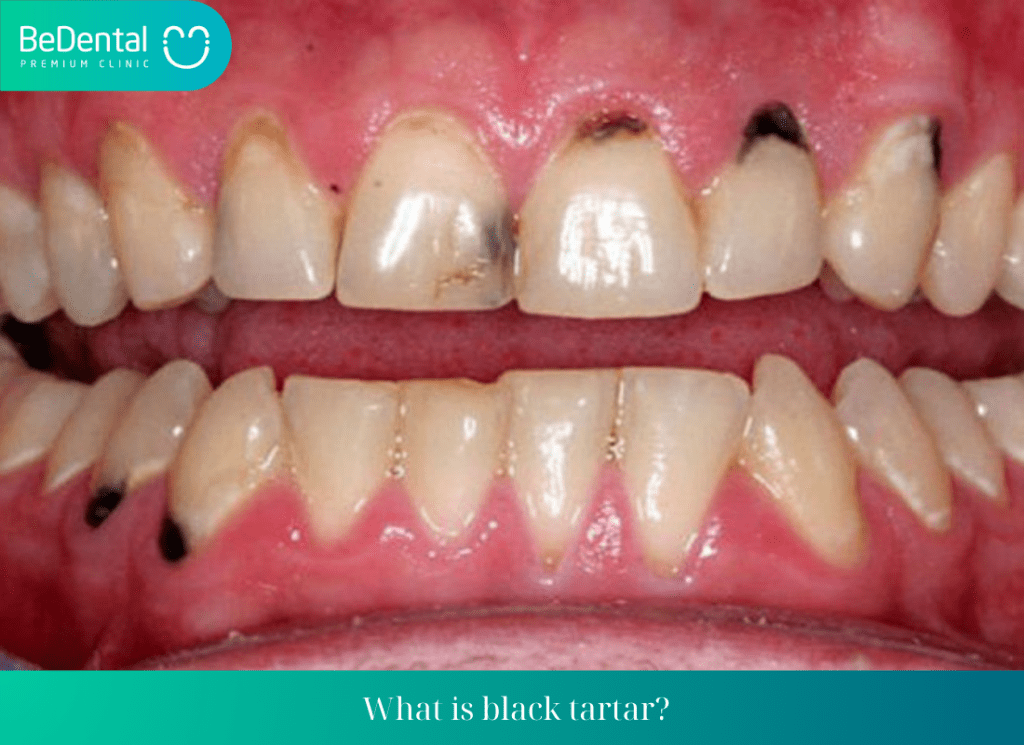
What is the cause of black tartar formation?
Black tartar forms due to various reasons. You need to determine the specific cause to find appropriate methods for removing black tartar. Specifically:
Neglecting regular tartar removal
Black tartar forms when previous yellow deposits are not properly addressed. Over time, these deposits harden and turn into black or brown tartar.
The initial yellow deposits are usually a result of the accumulation of bacteria, food debris, and saliva in the mouth. If not removed in a timely manner, these deposits gradually turn brown and black due to the formation of organic substances and minerals in saliva. Additionally, unhealthy habits such as smoking, excessive consumption of coffee, tea, or sugary drinks can also increase the likelihood of black tartar formation.
See more: Choosing between dental fillings for tooth erosion or dental crowns
Bleeding gums accelerate the formation of black tartar
Brushing too aggressively or having gum disease with bleeding can accelerate the process of tartar calcification, quickly turning it into black tartar. This is because yellow tartar can absorb the pigment of blood. Over time, they will harden and quickly turn brown and black.
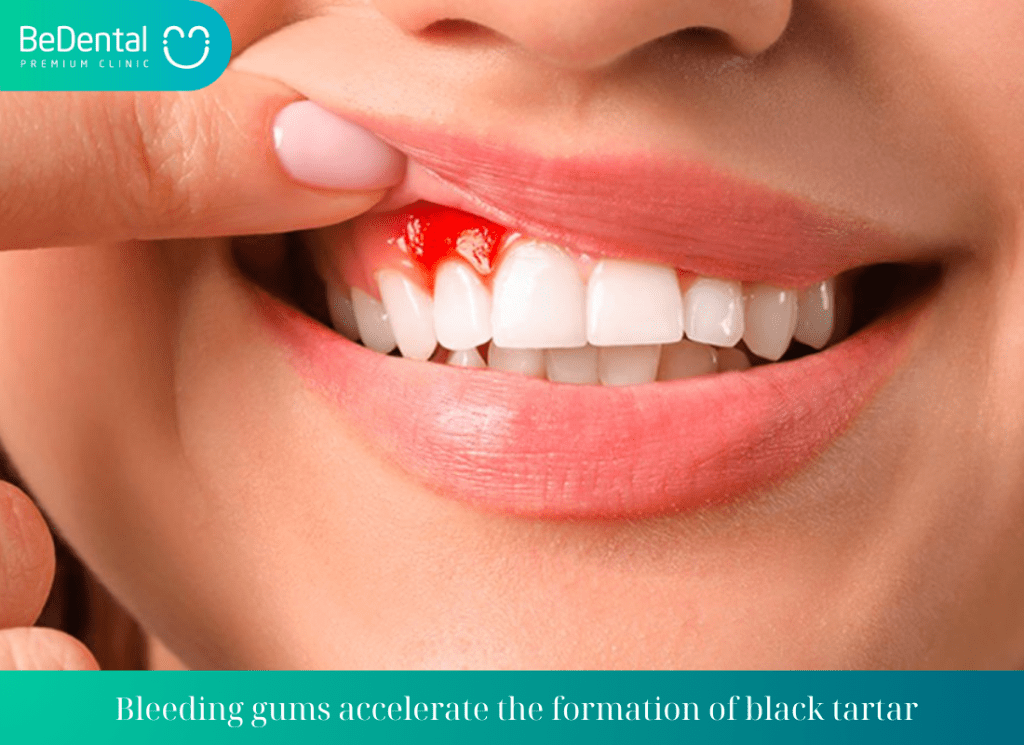
The plaque adheres to the gum line
The plaque on the teeth has the characteristic of easily absorbing pigments. Therefore, if you have habits like smoking or consuming colored foods such as coffee, tea, chocolate, cola, etc., it will quickly lead to the formation of black plaque.
In addition, the color of the plaque is often tough and difficult to clean. When brushing, if you neglect the gum line or the inner surface of the teeth, these plaques will turn black tartar on gum line, causing serious aesthetic issues.
See more: The Difference Between Plaque and Tartar: Understanding for Proper Oral Care
Suffering from tooth decay
Tooth decay is a common oral health issue, and if not properly cared for and treated, it can cause many serious problems for oral and overall health. Tooth decay can cause gradual tooth loss as it erodes the tooth enamel and can create cavities on the tooth surface.
Furthermore, if tooth decay is detected late and not treated in a timely manner, it can spread to other tissues and structures such as dental ligaments, jawbone, gums, and simultaneously cause serious complications such as infection, inflammation, and periodontal disease.
To prevent the negative consequences of tooth decay, it is necessary to have a good oral care routine and regular dental check-ups to detect and treat issues early.
If you experience symptoms of tooth decay such as toothache, tooth sensitivity, or pain with temperature changes, it is important to promptly visit a dentist for timely treatment and to avoid worse consequences in the future.
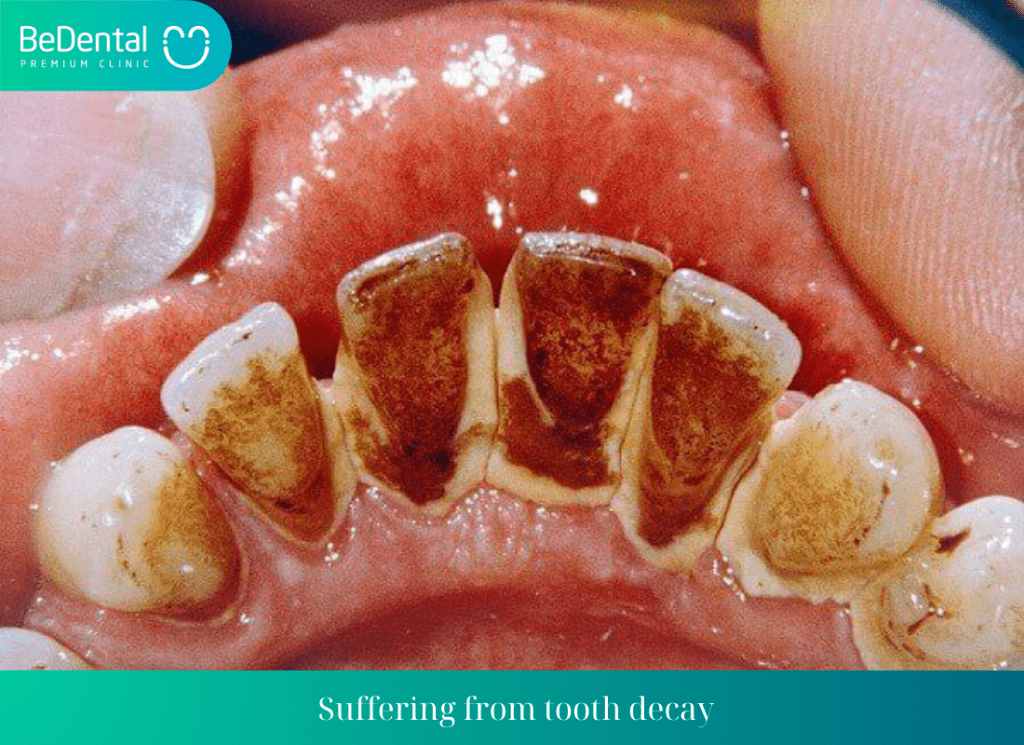
Is black tartar dangerous to human health?
According to experts, black tartar is a severe complication of regular dental calculus. If black tartar is not removed promptly, it can lead to the following dangers:
Causes gum disease and periodontitis
When black tartar appears, the bacteria in the oral cavity thrive. Over time, they will destroy the tooth enamel and gradually attack the gums.
Therefore, those who frequently experience black tartar often have symptoms of swelling and pain due to gum disease and periodontitis. This feeling will worsen and become more frequent if black tartar is not removed
Causes bad breath
When black tatar turns black and becomes difficult to remove, it creates a favorable environment for bacteria to thrive and grow. These bacteria can cause various oral health issues, including bad breath.
The bacteria that cause bad breath can produce toxic gases such as sulfur, ammonia, and other organic compounds, causing an unpleasant odor from the mouth.
Furthermore, the strong growth of these bacteria can also cause periodontal infections, which is an infectious inflammatory disease of the periodontium and surrounding tissues, causing symptoms such as gum bleeding, pus discharge, and swelling and pain.
The bacteria that cause bad breath can also be transmitted from one person to another when sharing objects such as utensils or through breathing. Therefore, bad breath not only affects your oral health but can also impact your social life.
To prevent and treat bad breath, you should take care of your oral hygiene daily by brushing your teeth, using mouthwash, and using dental floss to remove plaque. Additionally, regular dental check-ups are important to detect and treat oral health issues in a timely manner.
See more: How long does dental filling last?
Causes gum recession, bone loss, and even tooth loss
For those who have black tartar and do not receive timely treatment, it can be extremely dangerous. Black tartar has the ability to break the connections in the gums and tooth roots. If these connections are lost, you will experience gum recession, which is aesthetically unpleasing.
Furthermore, black tartar can also attack the jawbone and cause bone loss. Prolonged presence of black tatar can lead to permanent tooth loss.
In conclusion, black tartar poses significant risks to oral and overall health if not removed promptly and treated appropriately. It can cause gum disease, bad breath, gum recession, bone loss, and even tooth loss. Therefore, it is important to maintain good oral hygiene, seek regular dental check-ups, and address black tartar in a timely manner.
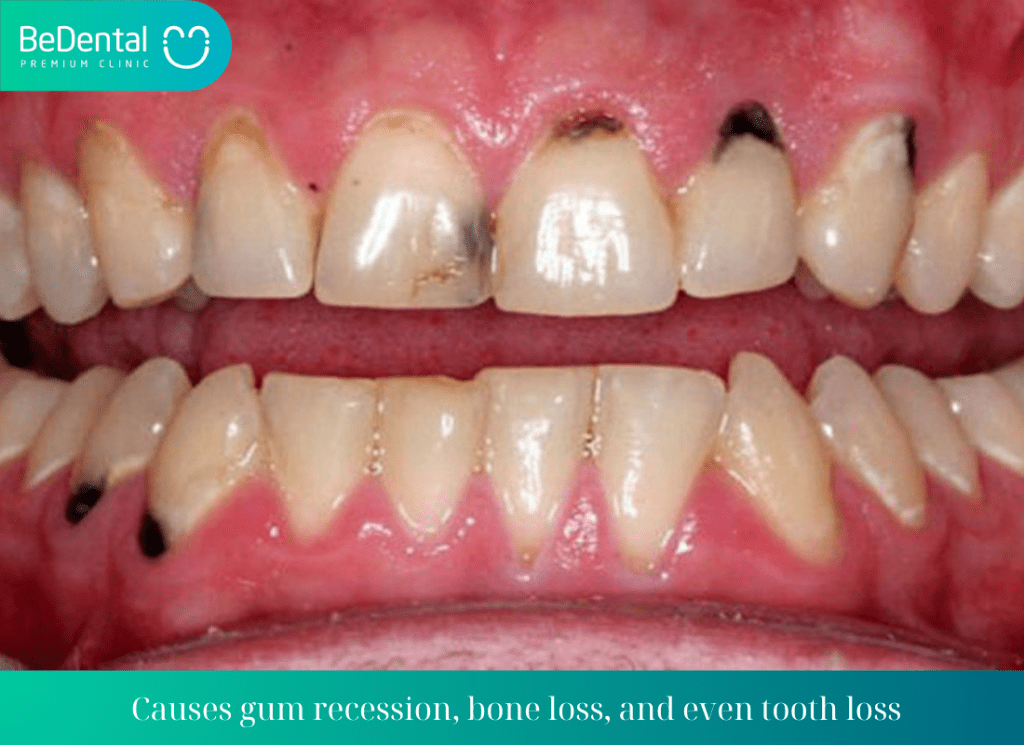
What to do with Black Tartar?
How to get rid of black tartar on teeth is a concern for many people. However, black tartar forms and adheres very firmly, so conventional brushing methods cannot remove it. Here are some effective and safe ways of black tartar on teeth removal at home that you can try:
Removing black tartar with lemon
Lemons contain a high amount of citric acid. According to research, citric acid can soften tartar when it comes into contact with dental plaque. As a result, removing black tartar becomes simpler and easier.
To effectively remove black tartar with lemon at home, you can follow these steps:
- Step 1: Take a fresh lemon and squeeze out the juice.
- Step 2: Dip a soft-bristled toothbrush into the lemon juice and brush your teeth as usual.
Note: Since lemon has a high citric acid content, it not only affects black tartar on the teeth but can also harm the natural tooth enamel. Therefore, the method of removing black tartar with lemon should be limited in frequency to avoid negative effects. It is recommended to use this method only once a week.
Removing black tartar with baking soda
Baking soda has long been used to remove stubborn stains. It is also safe for humans and can be used to remove black tartar in the mouth. Baking soda is a mild cleaning agent, so it ensures safety and effectiveness in removing black tooth stains.
In essence, baking soda has the ability to erode and soften tartar. This makes it easier to remove black tartar afterward. Additionally, using baking soda helps create an alkaline environment that inhibits the growth of oral bacteria.
To remove black tatar with baking soda, you can follow these steps:
- Step 1: Sprinkle some baking soda onto your toothpaste.
- Step 2: Brush your teeth as usual with a toothbrush. Only brush for about 2 minutes, then stop.
- Step 3: Rinse your mouth with water.
Note: Baking soda can also affect tooth enamel if overused. Therefore, with this method, it is recommended to use it only once a week.
Removing black tartar with orange peels
Orange peels contain a relatively high amount of vitamin C. It is known that vitamin C is effective in removing dental plaque. Additionally, orange peels have a mild taste, making this method suitable for children as well.

How to use orange peels to remove dental plaque:
- Step 1: Rub the inner side of the orange peel gently on your teeth for about 2 minutes.
- Step 2: Rinse your mouth thoroughly with clean water.
How to remove black tartar with white vinegar
White vinegar contains a high amount of acetic acid. This acid has the ability to activate the demineralization process of teeth, making it easier to remove black tartar. Here’s how to do it:
- Step 1: Mix the following ingredients: 2 tablespoons of white vinegar, ½ teaspoon of salt, and 1 cup of water.
- Step 2: Rinse your mouth with this solution twice a day.
See more:Teeth whitening strips
How to remove black tartar by visiting a dental clinic
Natural methods of removing black tatar using natural ingredients only have a mild effect on removing light dental plaque. For long-standing, hard, and firmly adhered tartar, the best method is to visit reputable dental clinics.
In addition, the method of removing tartar at reputable dental clinics has long-lasting effectiveness without causing harm to the tooth enamel like using cleaning agents or acids mentioned above. If good oral hygiene is maintained, the condition of black tartar may not return or take a long time to reappear.
Removing tartar using ultrasonic technology is relatively fast. It only takes about 10-15 minutes to completely remove all black tartar. For cases with more tartar, the dentist may take up to 30 minutes to completely remove these stubborn deposits.
Note: You should seek dental clinics that use ultrasonic technology to remove black tartar. This is a highly effective and safe method that is not painful. Additionally, choose a reputable dental clinic to have a team of dentists perform thorough and comprehensive tartar removal.

What to do if black tartar cannot be removed?
If black tartar cannot be removed, there are several options to consider. In some cases, the presence of black deposits may indicate tooth decay or internal damage.
This is often the case when the entire tooth appears black, rather than just the outer layer of black tartar. Depending on the condition, a dentist will recommend different treatment protocols.
Teeth whitening for blackened teeth
If the blackened teeth are a result of internal damage, teeth whitening may be recommended. The dentist will use whitening agents to restore the tooth’s enamel, removing the black deposits from the surface.
In addition to teeth whitening, the dentist may also apply accelerated enamel remineralization using blue laser light. This helps maintain the whiteness of the teeth for a longer period.
Dental veneers
In cases of severe blackened teeth where teeth whitening is no longer effective, the dentist may suggest dental veneers. This procedure involves applying a layer of porcelain veneer over the blackened tooth. These veneers closely resemble natural teeth in both shape and color, up to 99%.
After the veneers are applied, your teeth may appear more beautiful than before. They will have a bright, white color with high aesthetic appeal. Additionally, the hardness and durability of the teeth will be significantly improved.
Extraction of severely blackened decayed teeth
If the black tartar is caused by severe tooth decay, the best option may be to extract the affected tooth. This is especially true if the decay poses a risk to the jawbone. Early removal of the tooth is recommended in such cases.
After the decayed tooth is extracted, you may consider dental implant placement to restore the missing tooth. This will ensure proper chewing function and prevent jawbone resorption.
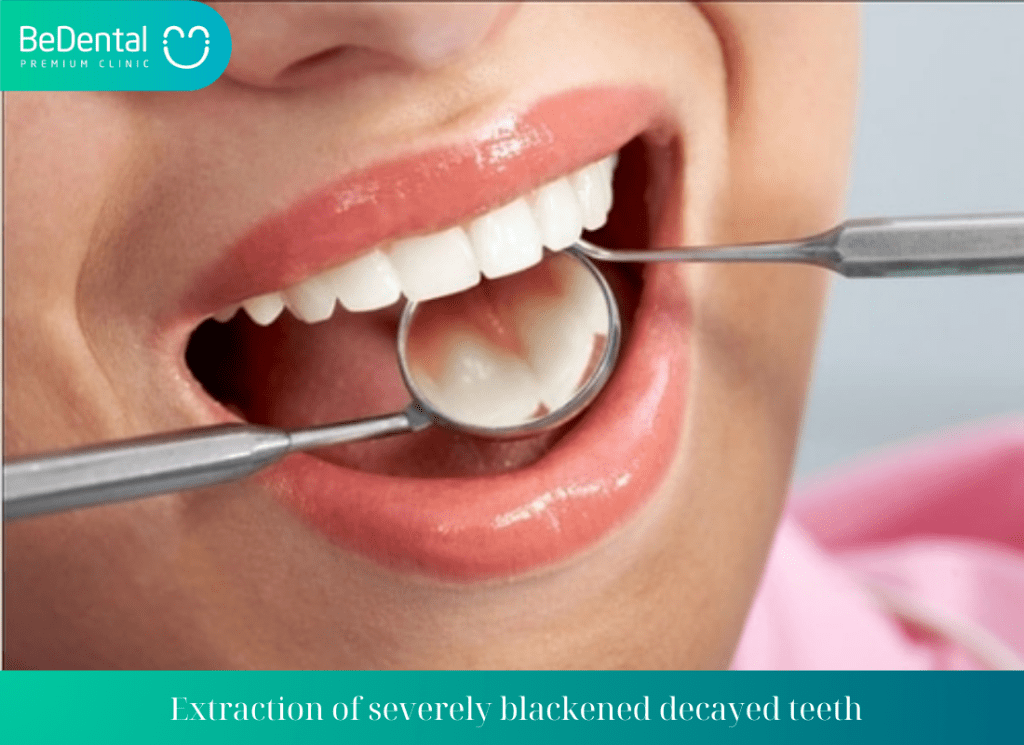
Tips for preventing the formation of black tartar
In reality, the formation of black tatar is mainly caused by daily eating and drinking habits. Instead of trying various methods to remove black tartar, you should also focus on preventing the formation of new black tartar. Here are some methods to help you limit the appearance and formation of black deposits:
- Brush your teeth regularly twice a day, preferably using toothpaste containing fluoride.
- Clean between your teeth with dental floss or interdental brushes.
- Use saline mouthwash to thoroughly clean your mouth after each meal.
- Limit the consumption of dark-colored foods and drinks such as coffee, tea, tobacco, alcohol, etc.
- Prioritize eating plenty of green vegetables in your daily diet.
- Visit a reputable dental clinic for regular tartar removal every 6 months.
See more: What are dissolvable stiches?
We hope that the useful information in this article has helped you understand the causes of black tartar formation and how to effectively and safely remove it.
If you are still unsure about finding a reputable and affordable dental clinic that uses ultrasonic technology instead of traditional sharp instruments for tartar removal, please contact BeDental. Our advisory team will provide free consultation and specific pricing information to address all your concerns.
Price list for reference:
| List | Time | Unit | Price |
|---|---|---|---|
| Dental Check up | 250.000 ~ 10$ |
||
| Tartar Cleaning and polishing (More detail...) | |||
| Tartar Cleaning and polishing - mild | ~15 mins | 2 jaws | 350.000 ~ 14$ |
| Tartar Cleaning and polishing - moderate | ~20 mins | 2 jaws | 450.000 ~ 18$ |
| Tartar Cleaning and polishing - heavy | ~30 mins | 2 jaws | 600.000 ~ 24$ |
| Other dental Service | |||
| Cleaning with Cacbonat sand | 15 mins | 2 jaws | 1.000.000 ~ 39$ |
| Operculectomy - Gumgivitis (Tìm hiểu thêm...) | 30 mins | 2 jaws | 2.000.000 ~ 75$ |
PLEASE LEAVE YOUR INFORMATION IF YOU WANT FURTHER DENTAL CONSULTATION
Tư vấn chuyên môn bài viết:
BÁC SĨ DƯƠNG THỊ THÙY NGA
Bác sĩ chỉnh nha tổng hợp
Ngôn ngữ giao tiếp: Tiếng Việt, Tiếng Anh, Tiếng Nga
Đặt Lịch Hẹn
Xem Hồ Sơ
Tư vấn chuyên môn bài viết:
BÁC SĨ DƯƠNG THỊ THÙY NGA
BEDENTAL - TOP STANDARD DENTISTRY SYSTEM
In HANOI
Address 1: 7B Thi Sach St, Ngo Thi Nham, Hai Ba Trung Dist, Ha Noi. - 0934.61.9090
Address 2: No 129 Hoang Ngan, Yen Hoa, Cau Giay Dist, Ha Noi. - 0934.61.9090
In HO CHI MINH
Address 1: 53 -55 -57 Pho Duc Chinh St, Nguyen Thai Binh, Dist. 1, Ho Chi Minh. - 0766.00.8080
Working: 9am - 8pm everyday
Website: https://bedental.vn/en/





